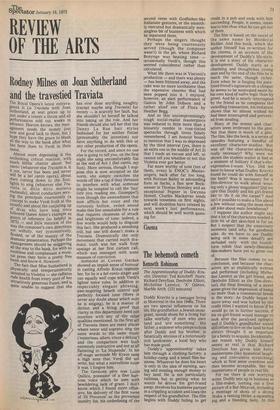REVIEW OF THE ARTS
Rodney Milnes on Joan Sutherland and the travestied Traviata
The Royal Opera's latest extravaganza is La Traviata with Joan Sutherland, at seat prices up to Just under a tenner a throw and all Performances sold out weeks in advance. Heaven knows, the management needs the money just now and good luck to them, but I hope they have the grace to blush all the way to the bank after what has been done to Verdi in their name.
Almost more depressing is the unthinking critical reaction, with much blithe chatter about 'be! canto' (whatever else Traviata is, it it not, never has been and never Will be a bel canto opera), about stars coming down to the footlights to sing (whatever else Traviata is, ditto ditto mutatis rnutandis), about conductors serving the principals courteously (a concept to make Verdi froth at the mouth) and about the conjuring up of divas who have long since followed Queen Anne's example as Points of reference (so helpful in 1975) — and little mention of the way the composer's own directions are wilfully, nay systematically, flouted, or of the inanity of the dramatic presentation. Perhaps the management should be sniggering all the way to the bank, for with so toothless and complaisant a musical press they have a pretty free hand, and know it. However •
The fact that Miss Sutherland is Physically and temperamentally unsuited to Violetta — she radiates rude health from every pore of her attractively generous frame, and is quite unable to suggest that she has ever done anything naughty (except maybe sing Traviata) for money — is scarcely her fault, but she shouldn't let herself be talked into taking on the role. And her friends should also tell her that the Danny La Rue hair styles fashioned for her neither flatter (presumably the intention) nor have anything to do with this or any other production of the opera.
For the record, and since no one else is going to tell you, on the first night she sang uncomfortably flat at the end of Act 1 (bel canto, my foot). More serious, though I suppose this is now accepted as the norm, she simply switches the words off like a tap if they threaten to interfere with what someone might be tempted to call the 'line' (are you reading me, Giuseppe?), even though the unsteadiness that now afflicts her voice and the curiously hollow, veiled sound make this line unsuitable for a role that requires cleanness of attack and brightness of tone: indeed, a few words would help to disguise this fact. She produced a smashing trill, but one trill doesn't make a Traviata. Dramatically the only movement that carried much dramatic truth was her walk from upstage at her first curtain call, which was managed with some measure of conviction. Someone at Covent Garden showed an impish sense of humour in casting Alfredo Kraus opposite her, for he is a bet canto singer and can equally well cope with Verdi's lighter tenor roles. In addition to impeccably elegant phrasing, awe-inspiring breath control and perfectly focused tone (there is never any doubt about which note he is singing), he is a master of diction and a living proof that clarity in this department need not interfere with any of the other qualities mentioned. In the first act of Traviata there are many places where tenor and soprano sing the same words to the same music Cmisterioso, alter°, croce e and the comparison was both extremely instructive and not at all flattering to 'La Stupenda'. In his off-stage serenade Mr Kraus sang a high note that Verdi did not write, but what a marvellous noise it was. I forgive him. The Germont pare was Louis Quilico, possessor of a fine bari tone voice which he uses with bewildering lack of grace. I don't know which I found more offen sive, his delivery of the first verse of 'Di Provenza' as the proverbial laundry list, his underlining of the second verse with Godfather-like Italianate gestures, or the smoothly executed but dramatically menaingless bit of business with which he separated them.
Perhaps the singers thought they were being courteously served (though the composer wasn't) in the pit, where Richard Bonynge was beating time — occasionally Verdi's, though this seemed coincidental rather than calculated.
What life there was in Visconti's production — and there was plenty — has been frittered away, and the cake was no more toothsome than the expensive cherries that had been popped into it. I enjoyed, however, an alert performance of Gaston by John Dobson and a rather aloof one of Flora by Heather Begg.
And so this uncompromisingly tough social-realist masterpiece was reduced to little more than a leisurely ramble in rose-tinted spectacles through times falsely remembered. I am honour bound to mention that I was so depressed by the third interval (yes, there is an extra one in the middle of Act 2) that I made an excuse and left, so cannot tell you whether or not this Violetta ever got better.
Far more worthy of note (ten of them, even) is ENOC's Mastersingers, back after far too long, with Norman Bailey in astounding form as Sachs, a fine new Beckmesser in Thomas Hemsley and an exceptional Pogner in Gwynne Howell. Charles Mackerras tends towards tenseness on first nights, and will doubtless have relaxed by next week's last performance, which should be well worth queuing for.


































 Previous page
Previous page